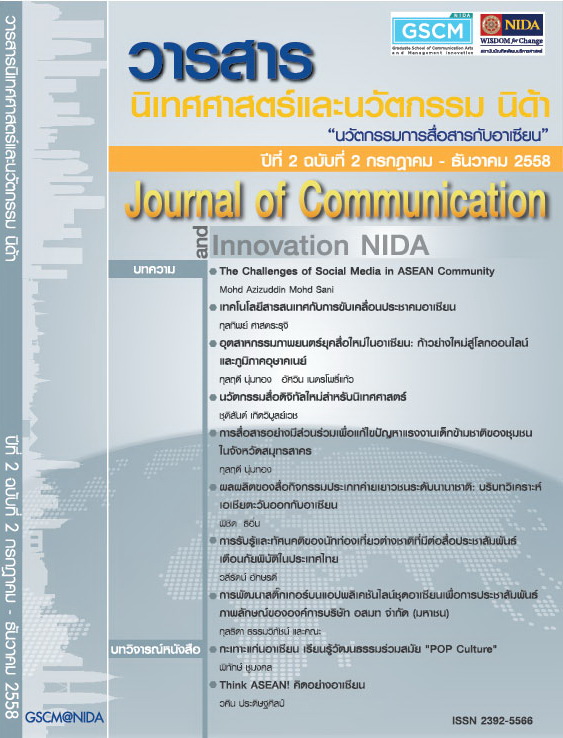ผลผลิตของสื่อกิจกรรมประเภทค่ายเยาวชนระดับนานาชาติ: บริบทวิเคราะห์เอเชียตะวันออกกับอาเซียน
Main Article Content
บทคัดย่อ
แนวทางในการพัฒนาและสร้างอำนาจความมั่นคงของแต่ละรัฐ มีพัฒนาการทางรูปแบบมาตั้งแต่สมัยโบราณกาลถึงยุคปัจจุบัน ในช่วงโลกสมัยใหม่รูปแบบที่ชัดเจนคือการล่าอาณานิคมของรัฐ เป็นการจัดการโดยผู้นำของรัฐกับรัฐ ต่อมาในยุคหลังโลกสมัยใหม่พัฒนาการทางสื่อและเทคโนโลยีสารสนเทศก้าวหน้าอย่างมาก รูปแบบและการจัดการกับกลุ่มเป้าหมายเปลี่ยนไป ความซับซ้อนและลุ่มลึกทางกลยุทธ์เทคนิคมีหลากหลายและผสมผสาน การขยายฐานอำนาจของรัฐได้นำเอาวัฒนธรรมและแนวคิดเรื่อง การเป็นกลุ่มมาใช้ หลายประเทศมหาอำนาจใช้สื่อกิจกรรมประเภทค่ายเยาวชนมาใช้ ด้วยเป้าประสงค์ทางการขยายฐานอำนาจของตนเอง อธิบายได้ว่า ผู้ส่งสาร คือ ประเทศเจ้าภาพผู้จัดค่ายเยาวชน, สาร คือ เนื้อหากิจกรรมต่างๆ ในค่าย ซึ่งส่วนใหญ่จะเป็นเรื่องความความร่วมมือและวัฒนธรรม, สื่อ คือ วัน เวลา และสถานที่จัดกิจกรรมค่าย และผู้รับสาร คือ เยาวชนอาเซียนที่เข้าร่วมกิจกรรมค่าย การศึกษานี้ใช้ประสบการณ์จากการมีส่วนร่วมในกิจกรรมค่ายเยาวชนระดับนานาชาติที่ถูกจัดโดยประเทศทางเอเชียตะวันออก ได้แก่ โครงการเรือเยาวชนเอเชียอาคเนย์ ของประเทศญี่ปุ่น โครงการค่ายเยาวชนจีน-อาเซียน ของสาธารณรัฐประชาชนจีน และโครงการความร่วมมือเพื่ออนาคตอาเซียน-สาธารณรัฐเกาหลี ของสาธารณรัฐเกาหลีใต้ ศึกษาเชิงคุณภาพแบบมีส่วนร่วม ด้วยเครื่องมือแบบสัมภาษณ์เชิงลึกวิเคราะห์กับแนวคิดทฤษฎีทางวัฒนธรรมศึกษาและการสื่อสารเครือข่าย ผลการศึกษาวิเคราะห์พบรูปแบบจุดร่วมและจุดแตกต่างของการจัดการค่ายเยาวชนระดับนานาชาติของสามประเทศเอเชียตะวันออก นอกจากนี้ยังพบความสอดคล้องของนโยบายแห่งรัฐทั้งสามประเทศต่อประเทศสมาชิกประชาคมอาเซียน ซึ่งประโยชน์แห่งการศึกษานี้เป็นองค์ความรู้ในบริบทอาเซียนในการต่อสู้ต่อรองกับประเทศเอเชียตะวันออก การปรับตัว รู้ทันต่อการบริหารจัดการที่ใช้สื่อกิจกรรมเล็กๆ อย่างค่ายเยาวชนระดับชาติมาเป็นเครื่องมือในการสร้างฐานอำนาจของประเทศเอเชียตะวันออก นอกจากนี้ยังเป็นแนวทางชั้นต้นในการศึกษาหาแบบจำลองของการบริหารจัดการเครือข่ายที่ดี รวมทั้งโครงสร้างการบริหารการสื่อสารเพื่อเป้าหมายในความสำเร็จของการดำเนินโครงการประเภทค่ายเยาวชนระดับนานาชาติ
Pattern of imperialism and state authority diffusion have been developing since ancient times to present. A clear pattern is the colonization of the state shows mostly in modernization era. These completed by leaders of the state with the state. Later in the postmodern world, media and technology advances. Form and management changing targets.The complexity and depth of the various strategies, techniques and blend. To expand the powers of the state have embraced the culture and concept. The approach develop to format of international youth camp. With an aim to expand their own power base.Explained that the sender is a youth camp host country that mostly is developing countries. Message is content in camp that mostly is about cooperation and culture. Media is timing and venue of international youth camp. Lastly, Receiver is ASEAN youth. This study uses the experience of participating in international youth camp that were organized by the East Asian countries, including the Southeast Asian Youth Ship program which organized by Japan, China - ASEAN Youth Camp which organized by People's Republic of China And the Korea-ASEAN future-oriented cooperation projects which organized by The Republic of Korea. In-depth interview and participatory approach was used as the tools for this qualitative research. In addition of the study of the theoretical concepts of cultural study and communication networks were fulfilled the result of research as well. Results of the study revealed a common and different points of the management of the international youth camp of East Asia nations. An analyze found consistency of state policies to ASEAN. The purpose of this study is the knowledge in the context of ASEAN in East Asian countries fighting the odds with an adaptive management approach to the cognizant small media activities. A national youth camps as a tool to build a power base of East Asia.
Article Details
ข้อความและความเห็นในวารสารนิเทศศาสตร์และนวัตกรรม นิด้า เป็นของผู้เขียนแต่ละท่าน มิใช่ของคณะนิเทศศาสตร์และนวัตกรรมการจัดการ สถาบันบัณฑิตพัฒนบริหารศาสตร์


